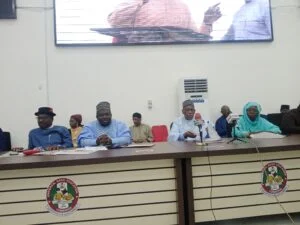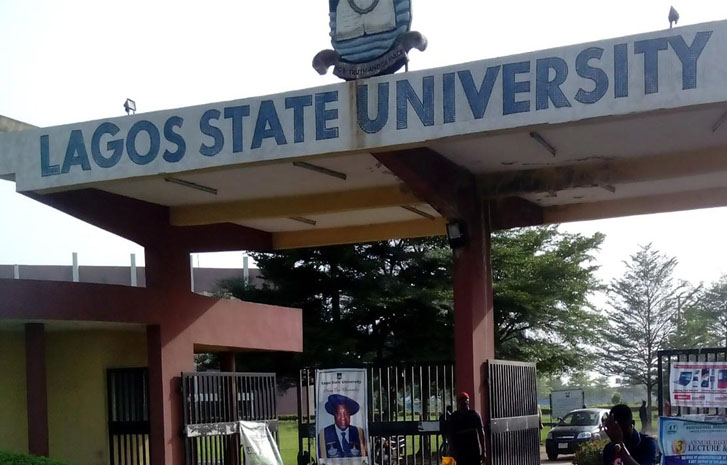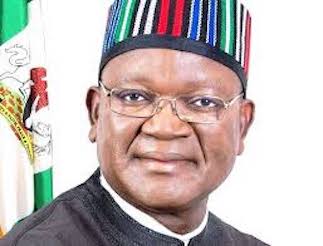Metro
UBEC Charges States to Implement Effective School Programme

I The Universal Basic Education Commission (UBEC) has called on States to implement Effective School Programmes (ESP) to produce basic education graduates with effective skills.
The Executive Secretary, UBEC, Dr Hamid Bobboy gave the charge on Monday in Abuja at a meeting of the commission with Chairmen of State Universal Basic Education Boards (SUBEBs)
He said the implementation of ESP would lead to investments in improving learning conditions and processes to produce basic education graduates with effective life skills.
He said equipping students with skills would also enable them to effectively participate and compete favourably in the 21st century knowledge-based economy.
“As a Commission, we have considered the prime importance of investing in improving key aspects of UBE delivery with a view to having better outcomes.
“This resolve is what prompted our drive toward reinventing the mechanisms for improved inputs and processes in the implementation of UBE activities, as this would be the safe guarantee of improved outcomes.
“ESP seeks to ensure collective actions at national and state levels in ensuring that prescribed minimum standards in basic education service delivery are attained,” he said.
He said the commission would support SUBEB toward implementing the minimum standards in all the schools previously designated as UBEC e-learning centres.
Bobboyi added that under ESP, the commission would distribute instructional materials, install satellite-based education system, train head teachers and teachers in the schools.
“As the programme progresses, additional improvements will be made in the schools with the goal of meeting the minimum standards in basic education.
“It is envisaged that through this effort, we will create Centres of Excellence as we improve the inputs and processes deployed for teaching and learning in the schools,” he said.
In his remarks, the Dean of Chairmen, SUBEB, Prof. Shehu Adaramaja , said the transformation of the e-learning programme into ESP would help improve the education outcomes of Nigerian students.
He said Nigeria is second in terms of literacy level in Africa noting that the full implementation of smart education would rank Nigeria as first in Africa.
Reports says that UBEC initiated and launched a smart education called the National Adopted School for Smart Education (NASSE) in 2021.
It is an effective approach of encouraging the younger generation to embrace technology at an early stage, particularly in the field of education. (NAN)
Metro
S’West Doctors threaten Strike over Unfavorable Allowances

Torough David, Abuja
The South-West Caucus of the Nigerian Medical Association (NMA) said its members may embark on strike if the unfavorable allowances introduced for doctors by the Federal Government is not withdrawn.
The caucus, which comprised Osun, Oyo, Ekiti, Ogun and Ondo states, said this at a news conference in Osogbo on Tuesday.
Dr Adeniyi Fasanu, the Caucus Chairman, stated that the recent circular issued by the National Salary, Income and Wages Commission (NSIWC) concerning doctors (increased) allowances, is not in tandem with economic reality.
Fasanu, who is also the Osun State NMA Chairman, said the national leadership of NMA had given the Federal Government 21-day ultimatum to withdraw the circular.
He said the southwest caucus aligns with national leadership of the NMA in demanding for: immediate correction of inconsequential adjustment in alignment with the 2001, 2009 and 2014 Collective Bargaining Agreements (CBAs).
“Full payment of 2025 Medical Residency Training Fund (MRTF) and comprehensive review of the fund to reflect current economic realities,” he said
Dr Olumuyiwa Alonge, Ondo NMA Chairman, said the FG did not consult them before announcing the allowances.
Alonge said this was the time medical doctors needed to be motivated as there was a serious shortage of doctors in the country, with a ratio of one doctor to 10,000 patients.
Speaking, Dr Ifedayo Oreyemi, Ekiti State NMA Chairman, said 2,000 doctors leave the country yearly, adding that if doctors’ welfare was not given adequate attention, doctors would continue to leave the country for greener pasture.
Ogun State NMA Chairman, Dr Luqman Ogunjimi said the NWIC circular on doctor’s allowances would discourage doctors that were already overworked and underpaid, to want to remain and practice in the Nigerian health sector.
Oyo State NMA Chairman, Dr. Happy Adedapo said the government needed to be responsive to the plight of doctors, saying the allowance being introduced was insignificant against the rising inflation in the country.
The caucus, among their 18 demands, also ask for the implementation of the 2021 hazard allowance agreement, and implementation of the revised retirement age for medical and dental practitioners.
They said if the Federal Government failed to attend to their demands, the caucus would convene an emergency meeting to advise their members appropriately in concert with the national leadership of NMA.
| ReplyReply allForwardAdd reaction |
Metro
Don Urges Curricula Reform to Include African Perspectives in Science, Logic

Torough David, Abuja
The Deputy Vice-Chancellor (Academics), Lagos State University (LASU), Prof. Oseni Afisi, on Tuesday called for reform of Nigeria’s education curricula to include African perspectives in science, logic and ethics.
Afisi made the call while delivering the 108th LASU Inaugural Lecture Series at the university’s main campus, Ojo.
Afisi is a Professor of Philosophy of Science, Logic and Critical Rationalism at the Department of Philosophy, Faculty of Arts, LASU.
Afisi’s lecture was entitled ‘The Oracle and the Open Society: Rethinking of Evolution of Authority and the Pursuit of Epistemical Justice in African Philosophical Thought’.
The inaugural lecturer said that teaching reforms should also emphasise dialogical reasoning, moral accountability and critical thinking rooted in local languages.
“Curricula at all levels of education must be reformed to include African perspectives in science, logic and ethics.
“Beyond token inclusion, educational content should reflect the depth, complexity and contemporary relevance of African philosophies.
“Teaching methods should emphasise dialogical reasoning, moral accountability, and critical thinking rooted in local languages, oral traditions and community experiences.
“Textbooks and materials should be developed to support these aims,” he said.
He said that scholars must rise to the challenge of rethinking epistemology beyond the western cannon.
“Scholars should embrace epistemic pluralism by critically engaging indigenous knowledge systems and legitimising their knowledge within global discourse.
“Research must not only be methodologically rigorous but also socially responsive.
“Interdisciplinary work that bridges philosophy, science and African worldviews should be encouraged through collaborative platforms and funding schemes,” he added.
He said that there was an urgent need to institutionalise plural approaches to knowledge.
He also said that national policies should formally recognise and regulate the interface between biomedicine and traditional healing system.
“Artificial Intelligence systems must be built with transparency, fairness and communal accountability at their core.
“Algorithmic decision-making tools should be subjected to ethical scrutiny informed by African communitarian ethics such as Ubuntu.
“Innovation hubs and tech curricula should incorporate training in philosophy of technology and digital ethics from African perspectives,” he said.
According to Afisi, the lecture was not merely about comparing African and Western systems of knowledge.
“It is about addressing a deeper concern: the epistemic injustice suffered by African traditions under colonialism and their continued marginalisation in our institutions today.
“It is about reclaiming the integrity of indigenous epistemologies, engaging critically with global thought systems.
“Let us, therefore, re-imagine African societies where technological advancement is tempered by moral insight, where education is guided by critical consciousness and where governance reflects dialogue and dignity.
“May the African open society not be a borrowed idea, but a living tradition, critically reconstructed, philosophically grounded and ethically sustained,” he said.
Metro
I was Pressured to Abandoned Benue Anti-open Grazing Law – Ortom

From Attah Ede, Makurdi
The immediate past governor of Benue State, Samuel Ortom yesterday alleged that he faced severe pressure from the immediate past administration of Muhammad Buhari to abandon the implementation of the anti-open grazing law in the state.
He further revealed that his refusal to step down the law as demanded by Buhari Govt, also denied him N75 billion grant given to other states governors to clear salary arrears of civil servants, gratuities of pensioners and infrastructural development.
Ortom, who disclosed this during a media interaction held at his residence in Makurdi on Thursday, explained that, at first, he was offered N40 Billion free interest loan for infrastructural developments and another N35 billion to clear salary, gratuities of civil servants and pensioners.
“So, I was pressured to abandoned the law but I said no and I was denied N75 billion in all, including taken free interest loan from infrastructural bank to finance development projects and clear salary and gratuities civil servants and pensioners because of my stance to defend my people”
“That was why the killings could not stop. Is not all about anti open grazing law. It is Fulani herdsmen agenda. Their plans to chase us out of our land. It’s about land grabbing and so, we must not allow it to happen. We should continue to pray for the governor of Benue State, Fr. Alia, the SGF and President Tinubu to succeed”, Ortom stated.
Speaking on the clamour by some northern politicians for power to return back to the north, Chief alluded that he stands with southerners to continue with the presidency comes 2027.
He maintained that in line with the gentlemanly agreement of rotating the presidency from North to South, he insisted that the South be allowed to complete its eight years before the baton returned to the northern part of the country.
“Till today, I, Ortom, believe in the southern presidency, even if my party (PDP) is producing a candidate for presidency in 2027, the candidate must be from the South. South should be allowed to complete eight years.
“So, for me, I am not supporting a northern candidate. But we will do strategic partnerships to win elections. I will encourage it. Samuel Ortom believed in the southern presidency. I will not support the northern presidency in 2027. It was a gentleman’s agreement that power should rotate between north and south”, Ortom stated. Even if my party is bringing a candidate from the south, we need to scrutinize the people before he can be accepted”.
Asked to assess the president’s administration, Ortom applauded the ongoing reforms of President Bola Tinubu, stating that the reforms were adding value to the economy.
“The Tinubu administration is doing well, je is ensuring that the rule of law prevails and this is good for our country.
“The oil industry had been a place where a few cliques siphoned our common wealth but with the removal of subsidy, there is a lot of money in all the states.
“The president even stated this during his visit to Benue at the height of the killing of our people in Yelwata where he said that no state would say it doesn’t have money to pay salary.
“Also, the tax reform is a good step, and the ongoing reforms will help our economy to grow, Tinubu is not partisan, his dream is to make the country grow.
While castigating Buhari’s administration the former governor said that the Buhari administration took the country from ‘top to bottom’.
Ortom who is now member of Board of Trustee of the Peoples Democratic Party said, he is not part of coalition, adding that he is a bona fide member of PDP, leader of PDP and member of BoT of the party which made him not to think of going out of the party.
“I remain a member and leader of Peoples Democratic Party, am even a board member of my party and I don’t believe in coalition but where there’s need for strategic partnership you will see me there.
“Politics is a game of interest, no permanent enemy or permanent friend, but permanent interest. I don’t believe in the coalition movement. President Tinubu is doing very well.
| ReplyReply allForwardAdd reaction |


















